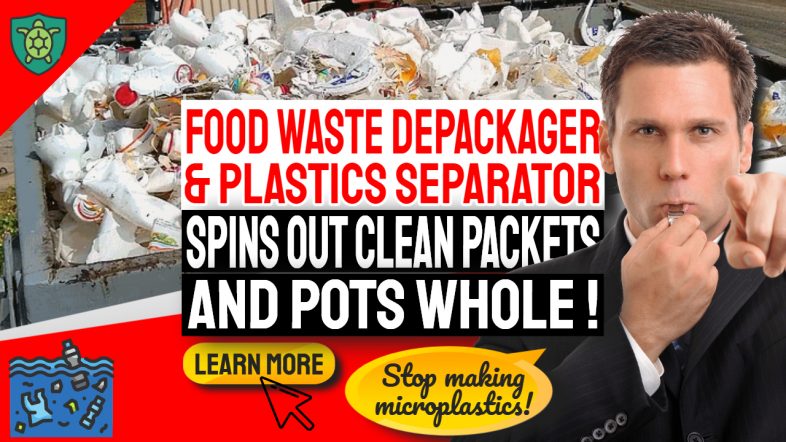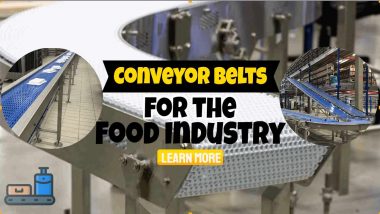A new food waste depackager and plastics separator is on the market and it is packed with disruptive technology. It spins out clean plastic including packets and even small pots whole. It spins but it has no rotating spinner barrel. It “cleans without washing“, and it is made by a small Canadian company, called Drycake®. It's now on sale in its Twister™ and Seditank™ range.
Rather than depackage and separate plastics by:
- milling,
- macerating,
- chopping or
- shredding as in competitor products, DryCake® went back to the drawing board.
They spent 5 years of food waste depackager and separator testing and “came up trumps” with a completely new system. A system that avoids all cutting, and is not based on processing plastic by particle size reduction.
The result is that almost no microplastics are generated. That has to be wonderful news with the devastating evidence now emerging of ocean microplastics ingestion killing plankton and marine life.
It's not only in the oceans that microplastics collect, it is on every beach. The density of plastic is such that tiny pieces of it drift in on ocean currents and it is accumulating in the sand of every tideline of the world.
Size reduction of plastic, in order to process it, is inherently unsustainable due to the production of microplastic particles. It has to be much better to avoid breaking up plastic packaging wherever possible. That's why we predict that this innovation will disrupt the industry and bring huge benefits to our planet.
DryCake “Twister™” Food Waste Depackager and Plastics Separator
The DryCake® “Twister™” is, in our opinion, a pretty astonishing food waste depackager, and the reality of this is evident to anybody who spends a few minutes observing the Twister plastic separator unit discharge as it opens and cleans food packaging.
In the food waste depackaging video that follows, it's clear that the plastic film and the containers that pop out are astonishingly clean and unbroken. Observe the heavier packing falling off a conveyor while the plastic film is being blasted out and flutters down.
Do take a few moments to view the DryCake Depackaging System Video below, which will teach you how this equipment works much faster than by reading! (At less than 7 minutes long we think it's worth your time.)

The findings of tests reveal chaotic behaviour due to the turbulence of a vortex. Water in the cylinder's bottom twists and departs the cylinder after passing through the filter. On the other hand, the air is drawn up and twists before departing the cylinder after passing through a filter.
The result is a wonderfully pure organic output, and a “market best” purity plastic fraction.
The technology accomplishes this without the need for washing. The amount of water required is minimal, and the end product is a slurry or “paste” that is rich in solids and low in water content. This implies that no more water is added than is absolutely necessary and that subsequent transportation expenses are kept as low as feasible.
The separated food waste depackager organics may be simply transported to a biogas plant for digestion and biogas generation, and this resource will be appreciated by every biogas plant operator. Operators will be delighted by the low levels of plastics, particularly microplastics, and the Drycake® philosophy of not letting plastic into a digester.
The power consumption for this type of equipment is very minimal, at 3-5 kW/hr per tonne of the plastic and food waste garbage handled. That is more crucial than ever now since COP26, as demonstrating low emissions and a high level of sustainability is becoming increasingly important for every firm.
Most significantly, the high quality of the clean plastic produced by this food waste depackager makes it an ideal investment for recycling operations, ERFs, and MRFs everywhere. Waste processing plants are in desperate need of innovative methods for producing clean plastic recyclates.
When recycled plastics are clean, they sell for the highest potential price.
Why is Plastic Waste on Everyone's Lips Right Now?
Plastic waste management has lately received a lot of attention, and it's still a hot problem throughout the world.
Wealthy nations' governments are attempting to limit plastic waste exports to RDF, or “recyclable plastic,” after being heavily chastised for dumping it on less-developed countries.
Numerous press stories have revealed that so-called “plastic recyclates” were sent to underdeveloped countries and ended up scattered across forests and polluting beaches. There has been an increase in the export of so-called recyclable plastics that are polluted to the point that they can be used for nothing more than landfilling.
Similarly, nations such as the United Kingdom have been exporting increasing amounts of Refuse Derived Fuel (RDF), which is largely composed of plastics. However, in accordance with the Waste Hierarchy, the majority of this material should be recycled as clean plastic recyclate.
The public's anxiety about rubbish being exported only to end up on beaches and on land all around the world has grown to the point that lawmakers are being obliged to act.
Never before has there been such widespread public understanding of the critical need to improve plastics handling. Many individuals in the United Kingdom are appalled to be shown dead and injured marine creatures as a result of plastic pollution in the water. And, this has been shown on TV screens to be harming wildlife in countless documentaries.
David Attenborough and others, appropriately, have given the entire plastics sector a bad name.
Growing Public Opposition to Purchasing Plastic Products
Consumers are abandoning plastic in favour of actively searching out and purchasing non-plastic alternatives. They prefer paper-wrapped items with cellophane and cardboard-wrapped products. These may be less sanitary and cause food to spoil faster. They claim that they do not want plastic.
Boris Johnson was simply echoing public opinion when he denigrated plastic in October 2021, just before the COP26 Climate Change Conference in Glasgow, Scotland, saying:
Recycling plastic materials “doesn't work” and “is not the answer” to threats to global oceans and marine wildlife – Boris Johnson, UK Prime Minister.
“Instead, we've all got to cut down our use of plastic”, he said, “. The Recycling Association said the PM had “completely lost the plastic plot”.
The public, and Boris, have forgotten that, for years, plastic wrapping has offered us affordable and fresh food. Nothing compares to it.
What is required to recover the reputation of plastic is for the Waste Management industry to invest in the current generation of repackaging technology.
They must start to show that they can clean up their image. Dry Cake's “Twister™” food waste depackager can do that.
It is a vortex system separator at its heart, and for industry-wide plastic recycling to function properly, it could just be the answer.
If food waste is depackaged in a sustainable way, ensuring that the resultant packets are mostly complete and clean plastic, the industry will be changed by producing:
- recyclable clean plastics that can be readily split from constituent polymers and manufactured into resin granules for use in plastic pressing gear and cheaply reused.
- This will prevent the imposition of additional charges on single-use plastic packaging throughout Europe,
- resulting in a low water content organic output free of plastics that is perfect for use as anaerobic digestion plant feedstock.
If the plastic waste stream is clean and pure, it may be converted into a valuable polyolefin (PO) material resource. This depackager produces a mixed plastics output. However, for extra value, this can be segregated into various polymer waste streams.
The demand for sustainable recovered PO, as well as all other common plastic polymers, is increasing.
Plastic packaging makers require recycled plastic to integrate into new packaging. Furthermore, in order to make plastic items including a percentage of recycled plastic, they will need to buy the recycled resin first. This means that package producers are now driven to pay more for recycled polymer than for fresh resin.

Changes in Plastic Waste Regulation will Drive the Market for Plastic Depackaging and Separation Equipment in 2022
In 2022, there will be significant changes in Plastic Waste Regulation.
Unfortunately, landfilling will continue to be the primary choice for millions of tonnes of plastics throughout the world for some time to come. However, this must alter post COP26.
Changes in state laws, as well as a growing international awareness of plastic waste, are set to have an impact. These will generate historic advancements in the management of plastic garbage reprocessing.
So far in 2021, three new or amended pieces of legislation have been proposed that will have a positive influence on long-struggling plastic reprocessing enterprises.
They are as follows:
- Plastic Waste Amendments to the Basel Convention, China's restriction on solid waste imports, and the European “Green Deal”. (The purpose of EU Green Deal law is to prevent the flow of unsorted plastic garbage that is not destined for ecologically acceptable recycling or disposal.)
- Along with the current regulations controlling the handling of plastic trash, new legislation will be enacted. New higher plastic recycling targets will result in increased demand for waste facility operators' recycled output.
The new regulation will require a certain amount of recycled material to be utilised in the production of plastics for use in food and beverage packaging. It's occurring all throughout Europe, and other countries are following the EU and UK's lead.
Recycled-content standards enacted in the European Union in October 2018 require producers to ensure that plastic bottles include at least 25% recycled material by 2025, and 30% by 2030.
UK Will Go Further Faster than EU to Encourage Plastic Recycling
In terms of plastic recycling, the UK is “greener and faster” than the EU.
In the United Kingdom, the government has gone a step further by instituting a new Plastic Packaging Tax, which will go into effect in April 2022.
This will apply not only to plastic bottles but to all UK packaging makers and importers of plastic, as well as to all packaging in general. It will be imposed on every package that has less than 30% recycled material.
Now that the United Kingdom has left the European Union, it is free to surpass EU norms. And, in the case of plastic packaging, it is acting faster and imposing a greater tax burden on non-recycled plastic packaging.
Encouraging the Circular Economy in Recycled Plastic
The tariff is intended to promote the use of recycled plastic in packaging as part of the circular economy. This new regulation essentially imposes a £200/tonne levy on plastic packaging that contains less than 30% recycled material.
The Untold Story of UK Plastic Recyclate Exports and Food Waste Depackaging Systems
Plastic reprocessors in the United Kingdom have been overly reliant on exports for far too long. They do so much exporting because their plastic recyclates have a larger market value abroad than they would if they sold them domestically.
This has arisen from a lack of investment in plastic separation technology, particularly food waste depackaging systems, in the UK. Most plastic is removed at Materials Recycling Facilities (MRFs) and allied waste processing facilities (such as MBT facilities) in the UK in a dirty condition, and with other unwanted material still in it, and then exported overseas as RDF.
Part of it is sold as RDF to EU towns and cities with excess capacity in their incinerators. This has occurred despite the fact that circular economy principles suggest (according to the EU Trash Hierarchy) that plastic waste should be:
- reused or otherwise,
- recycled.
Incineration is not a kind of “reuse” or “recycling.” It is categorised as “energy recovery.”
As previously stated, a large amount of unclean plastic has been improperly exported, only to wind up at best in developing-country landfills and, at worst, dispersed over land and washed into the sea.
The majority of the population, particularly in the United Kingdom, supports government action to halt the export of plastic garbage.
Food Waste Depackaging and Separation Systems are Invested in by Waste Plastic Processors as “New Technology.”
The legal amendments imposed in 2021 and 2022 will give an investment incentive for much-improved plastics processing not only in the UK but internationally.
The waste management sector in the United Kingdom and other countries that previously exported low-quality recyclate will be obliged to sell their output locally and to really improve the quality of their plastic recyclate. Once their output is of excellent quality, they will be permitted to export it again, even under the new, more stringent restrictions.
Plastic reprocessors in the United Kingdom who acquire plastic recyclate and further purify it before selling it for use in new goods should no longer be disadvantaged on price by exports to less-developed countries with fewer environmental regulations.
There will also be an increase in demand for recycled plastic granules as more recycled plastic will be required in plastic packaging to avoid the new plastic tax.
For all recycling facilities, ERFs, and MRFs, it will be a matter of:
- Act immediately to invest in the best plastic depackaging devices, properly separate it, and generate a saleable plastic output.
Or
- Make no improvements and, at best, lose any monetary value in that material when sold.
- Worse, you may have to pay a landfill disposal charge for your tainted plastic waste.
The answer is for plastic reprocessors to purchase and operate new depackaging technologies, such as the DryCake® “Twister™” food waste depackager.
Depackaging Equipment will be in High Demand
So, on the one hand, we will soon have stronger restrictions regulating exported mixed plastic garbage, and on the other hand, there will be an increase in demand for high-quality recycled plastics for use in the creation of new plastic items.
There are clear governmental and financial incentives for plastic reprocessors to recover substantial volumes of high-purity, single-stream plastic fractions.
A result of this will be that they will be in a better position to export their material and command greater rates for it, as it will meet the need for high-purity, single-stream plastics for reuse in food packaging.
The Benefits of Food Waste Depackaging Systems That Do Not Use Knives or Cutters
As noted here previously, all food waste depackaging devices employed knives, ball mills, or shredders to open bags and food packets.
The only way to open the plastic and assure complete removal of the packaged food contents was to cut it up into little fragments. This was the only method to avoid huge bits of plastic and plastic film that would clog and block later in the process.
This is counterproductive since it leads to greater plastic flake, small particle, microplastic content. Yet there was nothing better on the market prior to the Twister™.
The Importance of Microplastic Content Reduction from Food Waste Depackagers and Plastics Separators
If the tiny bits obtained by shredding and the usage of ball mills and macerators are effectively caught in the plastic fraction, the following separation by plastic polymer types during reprocessing into pure granules for re-use becomes more challenging.
Air-pulse jet ejection methods that use a near-infrared (NIR) sensor to separate mixed plastics into individual plastic polymers operate best on full bottles, cartons, and so on, but not at all on microplastics.
Typically, the organic component from bag openers and food waste depackagers is transferred to an anaerobic digestion facility. Following digestion, the residue will be marketed as a natural renewable fertiliser and soil quality improver. The owner of a biogas plant may rely on compost sales as a significant source of income.
If tiny particles of plastic are not properly collected in the plastic fraction during the depackaging step and exceed the allowable microplastic level in composted materials, as required by PAS110 in the UK, the compost is worthless. When this occurs, the material is only suitable for landfills, and the ecosystem plainly suffers as a result.
However, the finest repackaging equipment may give an organic proportion that is well within these limitations and meets PAS110 compliance.
Innovative Vortex Technology
Drycake's Twister™ System employs innovative vortex technology to shatter whole bags and sealed compartments.
This is accomplished not by cutting, but rather through vortex shear and high-velocity vibration on specifically shaped surfaces (metal screens). This method is quite successful in opening any sealed plastic container, regardless of its form or size.
Not only does this achieve opening, but it also serves as a quick and effective method of emptying each container, as well as a cleaning procedure that shakes and vibrates the food off the plastic surfaces.
Other food waste depackagers and food waste separators frequently use a mix of flotation, hot and cold washing, rinsing, and lastly drying.
The Twister's innovative Vortex technology accomplishes this in a single stage and almost instantly, decreasing overall contamination in the processed plastic fraction:
With a reduced energy consumption, there are much fewer operating parts that need service, higher reliability/fewer things that may go wrong, and a smaller footprint while consuming less water.
Conclusion on the Food Waste Depackager and Plastics Separator Spins Out Clean Packets and Pots Whole
Advances in automated food waste depackaging systems, waste separators, and improved sorting technologies can now provide outstanding purity in plastics recycling.
Plastic reprocessors are increasingly depending on creative new technologies such as vortex separation, which eliminates human sorting, to increase recycling rates and output quality.
Food waste depackaging systems are increasingly rising to the challenge of low-cost, low-carbon-footprint plastics recycling for plastic reprocessors, providing purity and yield dependability at a level where the plastic polymers may be reused in food packaging.
The top depackaging processes often remove well over 90% of the plastics. According to independent testing, the Dry Cake Twister™ removes 99.9% of the entering plastics.
All of this new technology will be in high demand in the coming years, as public disdain for plastics and the pollution they cause grows, and legislative reforms adopted in 2021-22 go into force.
Click on the following link to learn more about the DryCake Twister Separator.





